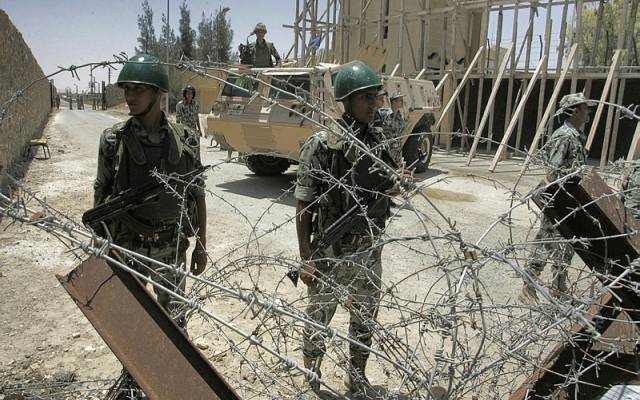Egypt proved long before October 7 that it is not a ‘peace partner’ for Israel and not a cooperative country.
By Shoshana Bryen, The Algemeiner
In capturing Rafah between the Gaza Strip and Egypt, Israel uncovered more than 50 smuggling tunnels — some large enough to drive trucks through. Big trucks.
Israel has said that it will continue to control the Philadelphi Corridor to ensure that Hamas cannot rearm itself. Egypt, a ceasefire negotiating “partner,” announced that it will not accept Israeli control. And, in fact, The New York Times reported that Egypt’s state-run Al-Qahera News quoted an unnamed senior official saying “there is no truth” to claims of Hamas tunnels under the border.
Sadly, there’s nothing new here.
Egypt proved long before October 7 that it is not a “peace partner” for Israel and not a cooperative country. During the 1978 Camp David negotiations, Israeli Prime Minister Menachem Begin wanted to return Gaza to Egypt along with Sinai. President Anwar Sadat was clear: Either Israel would keep Gaza and there would be a treaty, or Israel would try to return Gaza and there would be no treaty.
The Israeli leader made the decision to take Egypt out of the circle of war.
Sadat’s position was apiece with the Arab countries still at war. They had decided in 1949 that they would do nothing to help Arab refugees from what became Israel — that, they said, was Israel’s problem to solve. They put them Palestinians in refugee camps in Arab countries, closed the gates, and restricted their options. Gaza was a duty-free port for the Egyptian military; Palestinians were not able to live in Egypt proper, and the life and economic statistics were horrible.
UNRWA was actually created to settle the Arab refugees in Arab countries, the same way that international organizations settled refugees of the Korean War in Korea, and tens of millions of other refugees were resettled after World War II. The Arab states simply said no. [Read Adi Schwartz and Einat Wilf’s excellent The War of Return for details.]
Israel’s withdrawal from Sinai in 1982 reestablished a border between Gaza and Egypt — the Philadelphi Route — which divided the city of Rafah. (If you think the tunnels of Rafah were built by Hamas, you’re way late.) The 2005 Gaza disengagement was accompanied by the Philadelphi Agreement, under which Israel and Egypt pledged to work together to “stem terrorism, arms smuggling, and other illegal cross-border activities.” Israel was supposed to have access to the goods brought in by the Palestinian Authority (PA), which was, for a while, the government of Gaza.
Jordan was a bit different, but not much. It illegally annexed the West Bank and the eastern side of Jerusalem in 1950, giving citizenship to some resident Arabs, including some refugees. In 1972, the PLO tried to overthrow the King of Jordan; Israel stepped in to prevent Syria from taking advantage, but King Hussein knew the Hashemite Kingdom had no long-term future in the territory. In 1988, he renounced Jordan’s claim and stripped most of the people of Jordanian citizenship. No one seemed to have noticed.
Over the years, King Hussein not-quite-jokingly referred to Yitzhak Rabin as “Jordan’s Defense Minister for the West Bank.” [His heir, King Abdullah II, relies on Israel for economic assistance as well as security control.] Then, in 1994, he had the same discussion with Yitzhak Rabin in advance of the Jordan-Israel peace treaty that Sadat had with Menachem Begin: keep the West Bank and have a treaty, or push it on us and there won’t be one.
It was still going to be Israel’s problem to solve.
Israel’s war against Hamas in Gaza has exposed some serious shortcomings by Israel in the security of the Gaza Strip. Those will, no doubt, be the subject of a serious post-war assessment. But consider Egypt, Israel’s alleged peace partner and recipient of billions in US aid.
The Egyptian government refused to permit Palestinians displaced by the war to enter northern Sinai, even temporarily. Cairo claimed it would not be secure — although the mostly-empty area would easily hold Egyptian military camps for temporary refuge. Even NPR was critical of the decision.
The world later discovered that Gazans could buy their way out, though, for several thousand dollars, which tells you something about Egypt’s motives.
Egypt also delayed passage of aid trucks into Gaza after Israel took over the crossing, demanding a Palestinian presence restored on the Gaza side of the border.
After a (rare) rebuke by the US, Egypt agreed to reopen the crossing, but after another slowdown, Middle East Monitor reports that talks with the US and Israel in July failed to resolve the new impasse.
A week ago, an Israel-Egypt border agreement for Gaza was announced.
On Monday, Egypt reneged.
Israel will have to make the determination that serves its security interests. It would be in the interest of the United States and the Palestinian people to support a strong Israeli presence and control of the border to help break the control of the territory and the people of Gaza by Hamas.
